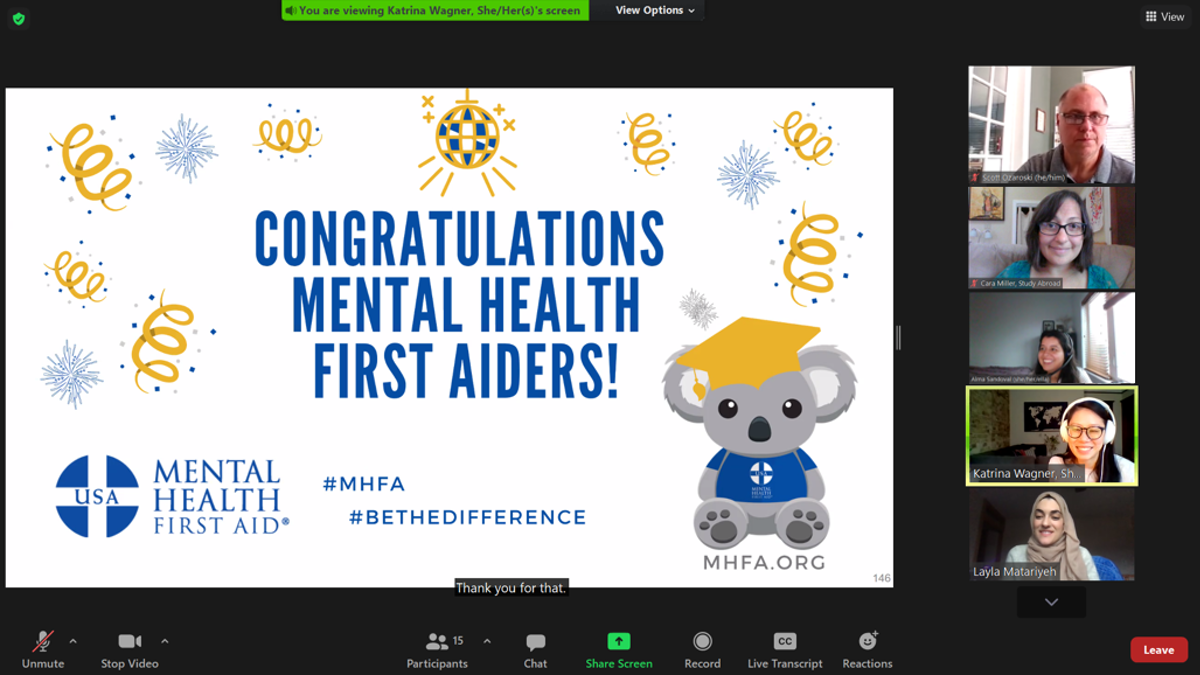 DePaul's Study Abroad office undertook mental health training during the pandemic.
DePaul's Study Abroad office undertook mental health training during the pandemic.When the COVID-19 pandemic canceled study-abroad programs around the world, DePaul's Study Abroad staff were left wondering how to continue serving students as everyone retreated to their homes. Their decision: Use this time as an opportunity by completing, as a department, the Mental Health First Aid training program implemented in 2019 by the Office of Health Promotion and Wellness.
"We have been wanting to expand our knowledge of mental health," explains Scott Ozaroski, the associate director of program management in Study Abroad, "after noticing more students needing mental health support over the past few years. We heard about the training being offered for free at DePaul, and the whole office took advantage of it."
Through the Mental Health First Aid training program, HPW is educating the DePaul community on the struggles and identification of mental health issues. The nationally recognized program teaches people how to assist someone going through a crisis, just as they would provide CPR to someone having a heart attack.
In a MHFA training session, says Katrina Wagner, the health promotion coordinator in HPW, "individuals will learn how to recognize the signs and symptoms of a mental health crisis, provide support until they can connect with a professional, and help stabilize the person."
This assessment capability is particularly useful for staff in the Study Abroad program.
Cara Miller Bryant, a Study Abroad advisor, says, "A lot of times students think they can escape their problems in the U.S. by going abroad. Students who are abroad for a semester or year often experience homesickness and can slide into depression."
Even shorter trips, such as over winter or spring break, can be a challenge. "You're with 15-20 other people for nearly 24 hours a day over one or two weeks. That can quickly turn into a highly stressful dynamic for some students," Ozaroski says.
Plus, travel can take students away from their support networks, including family, friends and doctors.
"The Mental Health First Aid training has helped us take our knowledge to the next level in order to support our students," Ozaroski says.
The training introduces a method called ALGEE that encourages people, when assisting someone with a mental health concern, to
assess risk;
listen non-judgmentally;
give reassurance and information;
encourage appropriate professional help; and
encourage self-help and other support strategies.
"I've kept ALGEE in mind ever since I took the training last March," Miller Bryant says. "It helps me remind myself to be aware of how people approach mental health concerns differently across cultural backgrounds."
Ozaroski and Miller Bryant say the training improved their comfort and confidence when dealing with a student in crisis.
"Sometimes you are hesitant to say something that might offend a student," Ozaroski adds, "but with ALGEE I learned how to ask questions thoughtfully, in a concerned manner and with patience."
While the training is proving handy for Study Abroad staff, it is also important for any office at the university, giving staff the tools to support themselves and each other as well.
"We have already seen mental health concerns on the rise for a while now, and after the pandemic I think this training is even more crucial for people to partake in," Ozaroski says.
Study Abroad staff describe the program as worth your time. "I recommend it to everyone at DePaul," Miller Bryant says. "It is just so informative, as well as an investment in myself with the opportunity to take what I learned and apply it to the way I support our students."
The Mental Health First Aid training program has sessions available throughout the summer and will offer more in the upcoming fall quarter. More information, including how to sign up for the program,
is online.